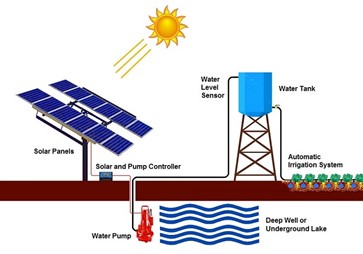
Traditional irrigation that utilizes water from river diversions or natural springs has historically been a major means of ensuring food security and income to the majority of Tanzanian farmers. Like elsewhere in the country, smallholder farmers in the project areas have historically depended on this type of irrigation system for decades to sustain their livelihoods. However, the situation has changed significantly in recent years whereby farmers in the project areas are no longer able to rely on traditional irrigation schemes except during the during rainy seasons only. This is largely rains have become shorter and unreliable thereby making it impossible for rivers and streams to flow continuously throughout the year in support of the traditional rain-dependant farming activities.
Currently, solar powered irrigation technology is not being used in the project area due to financial barriers. This situation forces farmers to rely on seasonal traditional rain-fed farming system which has increasingly become ineffective due to changes in rain patters under the influence of climate change. As a consequence, only, few smallholder farmers who are capable of hiring diesel powered generators to irrigate their farms during dry season do so, a fact that has been increasing the cost of production and perpetuate socio-economic inequality among community members in the project areas. Through this project, affordable and reliable source of power will become available to all smallholder farmers thereby enabling them to irrigate their farms throughout the year and reduce the existing inequalities, enhance productivity and hence well-being of the community.
Aim
This project aims at enabling the poor, marginalized and vulnerable smallholder farmers in three villages (Kambi ya Nyuki, Kilima Mbogo, and Mkombozi) located in the dry lowland plains of the southern part of Mt. Kilimanjaro to overcome the pervasive challenges of poverty, food insecurity, gender inequality and water use conflicts caused by lack of access to reliable and affordable water supply for irrigation purposes as compounded by the growing impacts of climate change.
Objective
Solar-powered irrigation technology adopted directly by 1,200 households (of smallholder farmers) cultivating and irrigating approximately 2,400 acres of available agricultural land in the three target villages. Indirectly, the project will benefit over 6,000 smallholders’ farmers mostly women and youth who are the dominant workforce for the agriculture sector accounting for 60% in target villages and the country as a whole.
Approach
productive use approach of renewable energy at community level
The project embraces the productive use approach of renewable energy at community level. It will be implemented in such a way that it promotes the catalytic role of solar-powered irrigation technology to increase production for smallholder farmers in the project area through Water User Groups (WUGs) and Farmer Groups through Farmer Field Schools (FFSs) approaches. These approaches have been tested in several other communities with similar nature of challenges and proved to work efficiently. The approaches will empower community in various aspects such as; local livelihood capital enhancement, skills development, leadership and also adoption of modern green agricultural practices and input management which are crucial for transformation and improvement of their livelihoods
whole-village approach:
In order to ensure inclusion, the project implementation adopts a whole-village approach preceded by the village assembly whereby all villagers are invited to the hear and learn about the project including the opportunities and procedures for getting involved in the project.
Regions
Hai District, Near Mt. Kilimanjaro, Tanzania
Period
Febuary 2021 to August 2022
